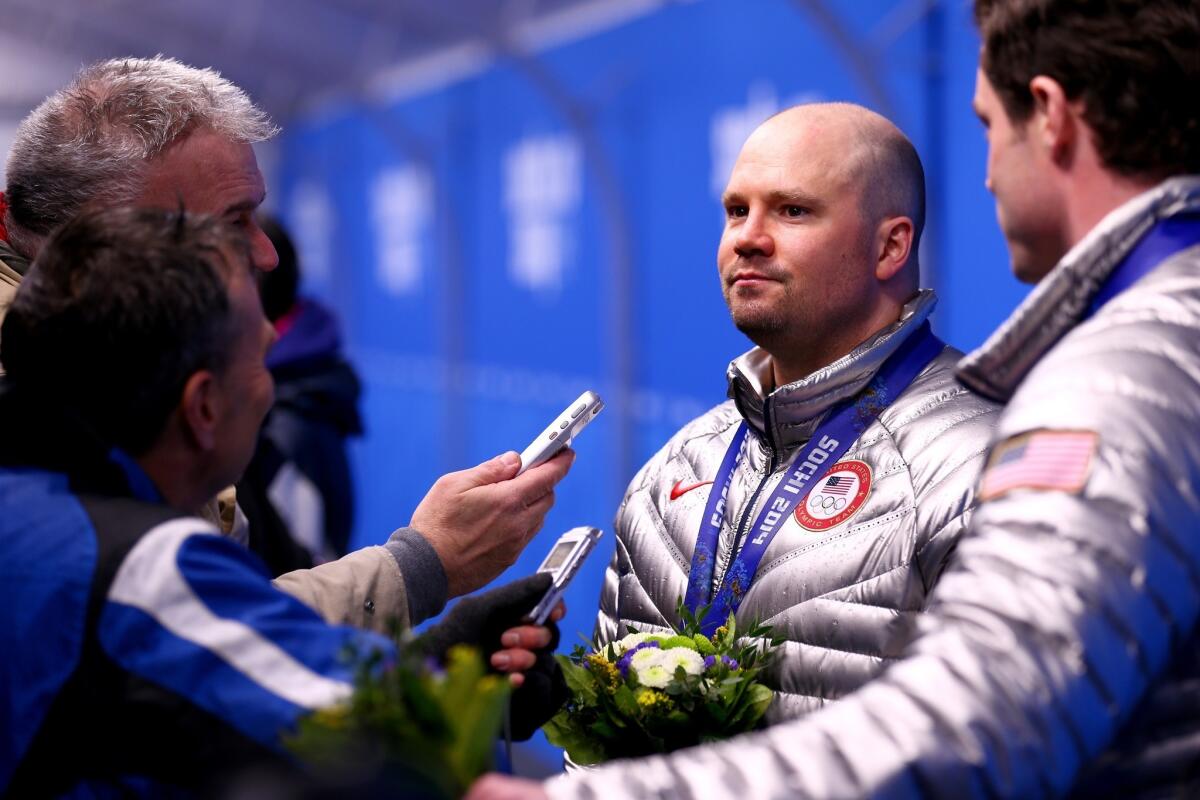Sochi Olympics TV moment: Steven Holcomb and the workaday medalist

- Share via
The Olympics were designed as a collection of sports for the everyman -- amateur athletes taking breaks from day jobs to do grueling things that, if they do them long enough and hard enough, may allow them to hang a medal in the family room one day.
With tens of millions of viewers tuning in to NBC’s telecasts each night, with many of the athletes well beyond amateur status, and with the inevitable Subway endorsement deal that follows the top winners, it doesn’t always feel that way in 2014. The athletes have been professionalized, and so has the celebrity culture around them.
Yet the clock rolled back, for a minute, on Monday night, when TV viewers tuned in to watch Steven Holcomb and his brakeman Steve Langton win a bronze medal in the two-man bobsled. Even if, it should be said, some of those TV viewers were mainly just waiting around for the ice dancing competition to start.
PHOTOS: Olympic Games TV moments worth remembering
By many metrics, Holcomb is the most successful sportsman the U.S. has at these Games, in part because he wins at a sport Americans rarely succeed at. The Germans and Swiss are amazingly dominant at the two-man bobsled: Coming into this year, the two countries had combined for an astonishing 26 of the 33 available medals in the last 11 Games dating all the way back to 1972. An American? He hasn’t stood on the podium for 62 years.
Holcomb broke that streak with a steady series of runs and a BMW-designed sled. He kept the Germans off the podium (well, minus the sled). And he will defend a gold medal in four-man bobsled this weekend -- the first time in 62 years that’s happened too.
You can be forgiven for not knowing Holcomb’s name, or thinking of him as “that kind of chunky guy who never seems to make much of an impression.”
As skilled a driver as he is, showmanship is not exactly Holcomb’s thing. After the medal-clinching fourth run Monday, there was mainly a lot of fist-pumping in the air but no viral video-worthy celebration. Holcomb got out of the sled and hugged his team, but you couldn’t see his face, or much of it, because he was still wearing his headgear. The most demonstrative thing he did in the aftermath of the run was smell some congratulatory flowers.
PHOTOS: Winter Olympics in film
Even the dude’s nickname -- Holcy -- doesn’t exactly scream Hollywood glamour. When he tried to start a dance -- “The Holcy” --four years ago, it became popular for a minute, but the Harlem Shuffle it wasn’t. (Compare that to the luger-turned-bobsled Russian champion Alexander Zupkov, who won the gold in two-man, or, for that matter, the Jamaican two-man team, who I swear would have gone faster down the course had they done so backward, yet were consistently entertaining in post-race appearances.)
The funny thing is that Holcomb’s backstory is actually interesting. He suffered from a degenerative eye condition that nearly took him out of the sport after the Torino Games in 2006, until a highly experimental surgery corrected it. He has also battled depression, a condition that prompted a pharmaceutical regimen that helped him but also led to weight gain (and had viewers of the Vancouver Games snickering). But it’s not the death-of-a-sibling that makes for an instant prime-time backstory, which is why you didn’t hear (relatively) as much about it from NBC’s bobsled commentators Leigh Diffey and John Morgan on Monday.
When Holcomb showed up on “Today” Tuesday morning to revel in his win -- in a “USA” ballcap and decidedly downscale duds -- he was likable only in a vanilla kind of way. Al Roker tried to feed him a line, originated by Holcomb, that the difference between two- and four-man bobsled is the difference between a sports car and a bus, but he didn’t do much with it. His best line, and only real attempt at a joke, was that, given all these droughts he was ending, he wanted to take the number 62 to Vegas. Could there be anything more everyman? It’s all so square it’s almost refreshing.
PHOTOS: Behind the scenes of movies and TV
Given how celebrity culture works these days, surely there’s a country-music producer or Middle-American-skewing cable executive who is figuring out how to tap into the anti-celebrity of Holcomb. We’ll see if it takes. In the meantime, as U.S. hockey stars prepare to make their run to a medal, as the Bode Miller Show continues apace at two more events, as anointed alpiner Mikaela Shiffrin gets ready for her post-Olympics media appearances, and as fellow teenager Gracie Gold looks to be the next limelight-ready figure skater, Holcomb will wrench up his sled, practice his starts and try to earn a top finish in the four-man competition, compellingly doing not very much compelling at all.
[Note: This is part of an ongoing series documenting the Sochi Olympics from a TV perspective. Every morning of the Games, we’ll look at a key moment from the previous day that NBC captured, elevated, honored, bungled or otherwise reported in a notable way, as only the most-televised event on the planet can be covered.]
ALSO:
Sochi Olympics TV moment: Slopestyle sweep, Skating slip
Sochi TV moment: Pikus-Pace and the too-personal problem
Sochi TV moment: Bode Miller’s likely Olympic finale, odd and fitting
Twitter: ZeitchikLAT
More to Read
The complete guide to home viewing
Get Screen Gab for everything about the TV shows and streaming movies everyone’s talking about.
You may occasionally receive promotional content from the Los Angeles Times.







